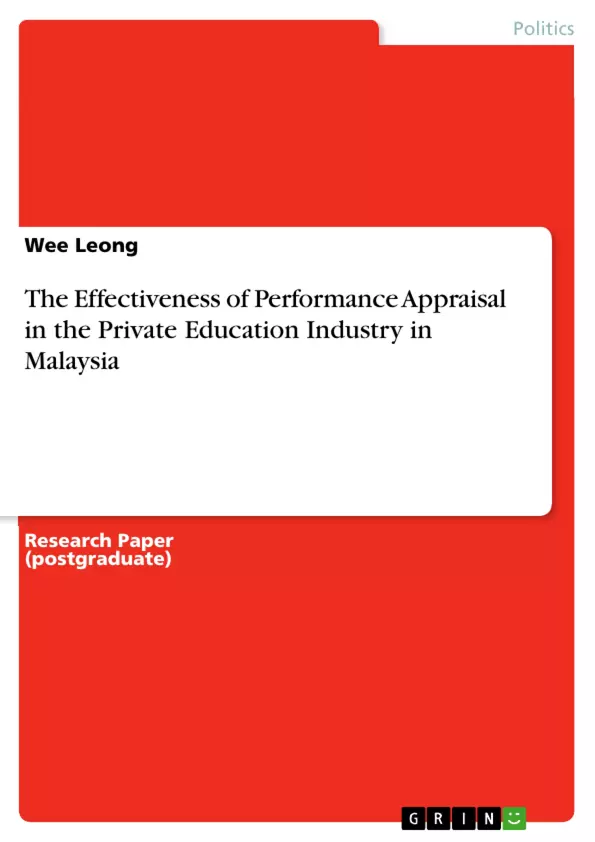Employee performance appraisal is one of the most commonly used management tools especially in the United States and it has started being used in Malaysia about a couple of decades ago. As such performance appraisal is also one of the most widely discussed and researched areas in industrial/ organizational psychology (DeNisi, 1997; Murphy & Cleveland, 1995). The purpose of this study was to investigate the factors that contribute or affect the effectiveness of performance appraisal in the private education industry in Malaysia. Specifically, this study focused on the positive influence of these determining factors to the organization and the competitive advantage that the organization can achieve. This study also aimed to determine the factors of concern about the effective implementation of performance appraisal system. An integral part of this research was to develop and empirically test a model of effectiveness of performance appraisal in the context of the private education industry in Malaysia. Based on the concepts of Longenecker’s and Fink’s (1999) System Perspective and Greenberg’s (1986) Organizational Justice Theory, this research used a questionnaire to assess Malaysian private education industry in terms of their cognition and perspective of the effective system design, managerial systems practices and system support toward effectiveness of performance appraisal, as well as to assess their perceived fairness toward achieving an effective performance appraisal system. A questionnaire survey method was used to collect primary data from emails which have been sent out to the participants. The survey yielded 171 usable questionnaires, with a response rate of 36.08 percent. Statistical analysis methods and structural equation modeling with IBM AMOS version 18.0 were used to analyze the data. The research findings revealed that the system design, managerial systems practices and system support were significantly and positively related with the effectiveness of performance appraisal. Based on the research results, managerial implications and opportunities for future research are discussed.
Inhaltsverzeichnis (Table of Contents)
- Introduction
- Literature Review
- What is Performance Appraisal
- Why Use Performance Appraisal
- Performance Appraisal Techniques & Methods
- Traditional Approach
- Modern Approach
Zielsetzung und Themenschwerpunkte (Objectives and Key Themes)
This research aims to examine the factors influencing the effectiveness of performance appraisal in the private education industry in Malaysia. It explores the positive impact of these factors on organizational success and competitive advantage. Additionally, the study investigates concerns regarding the effective implementation of performance appraisal systems.
- Factors influencing the effectiveness of performance appraisal in the private education industry in Malaysia
- Positive impact of these factors on organizational success and competitive advantage
- Concerns regarding the effective implementation of performance appraisal systems
- Development and empirical testing of a model for the effectiveness of performance appraisal in the Malaysian private education context
- Application of Longenecker's and Fink's System Perspective and Greenberg's Organizational Justice Theory to performance appraisal
Zusammenfassung der Kapitel (Chapter Summaries)
Introduction
This chapter introduces the research topic, highlighting the growing importance of performance appraisal in today's competitive business environment. It emphasizes the need for effective performance appraisal systems to measure employee performance, provide feedback, and support organizational goals. The chapter also outlines the research problem, which focuses on investigating the factors that influence the effectiveness of performance appraisal in the private education industry in Malaysia.
Literature Review
This chapter provides a comprehensive overview of existing literature on performance appraisal. It delves into the definition, purpose, techniques, and controversies surrounding performance appraisal. The chapter also examines the specific context of performance appraisal in Malaysia and the private education industry, highlighting key factors that contribute to effective performance appraisal systems. It further explores the concepts of fairness and organizational justice as they relate to performance appraisal.
Schlüsselwörter (Keywords)
Performance appraisal, private education industry, Malaysia, effectiveness, system design, managerial practices, system support, organizational justice, fairness, competitive advantage, human resource management, employee performance, employee development.
Frequently Asked Questions
What is performance appraisal in the context of Malaysian education?
It is a management tool used in private educational institutions to evaluate employee work performance, provide feedback, and determine development needs.
What factors make a performance appraisal system effective?
Key factors include system design, supportive managerial practices, organizational support, and the perceived fairness of the process by employees.
What is Organizational Justice Theory?
It explores how employees' perceptions of fairness in the workplace (distributive, procedural, and interactional justice) affect their motivation and attitudes toward the appraisal system.
Why do private schools use performance appraisals?
To gain a competitive advantage, improve teaching quality, justify administrative decisions (like promotions), and foster employee growth in a competitive industry.
What were the findings of the study in Malaysia?
The research revealed that system design and managerial support are significantly and positively related to the overall effectiveness of the appraisal system in the private education sector.
- Quote paper
- Wee Leong (Author), 2013, The Effectiveness of Performance Appraisal in the Private Education Industry in Malaysia, Munich, GRIN Verlag, https://www.grin.com/document/283614



